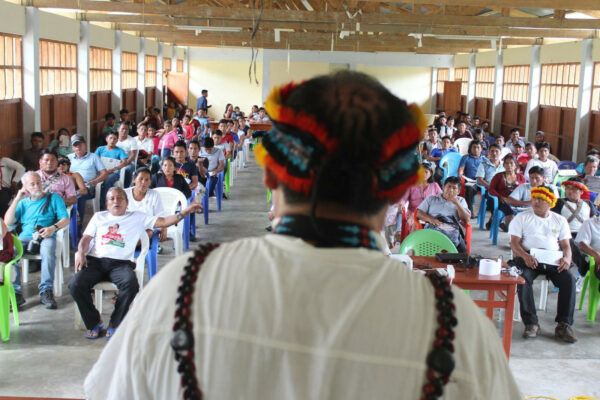Washington, D.C. – Next week, the United States Export-Import Bank and the Inter-American Development Bank will vote whether to approve public monies for the $2.6 billion Peru’s Camisea gas project. NGOs are working to delay the vote and point to results of recent field documentation showing extensive environmental damage and erosion that is choking pristine rivers and killing off fish stock in primary Amazon Rainforest.
A preliminary report released today by U.S. NGOs Amazon Alliance, Amazon Watch and Environmental Defense confirms that the project has begun to cause food shortages and is leading to the spread of disease to indigenous communities in the Urubamba Valley. Health workers and the local Machiguenga indigenous organization warn that children and populations living in isolation are at risk of displacement and disease.
Ex-Im’s support would run counter to its own environmental policies and could undercut the Bank’s leading role within OECD countries to promote higher standards for export credit agencies. It would no doubt damage Bank President Philip Merrill’s record and image as a conservationist.
The report points to the project operators’ failure to follow high industry standards. Technical analyses prepared by Jamie Maughan, from the Global Village Engineers describe massive landslides and soil erosion from the pipeline’s extremely steep route. Erosion during recent heavy rains has washed thousands of tons of soil and vegetation into local rivers.
River siltation has decimated fish stocks. “Above all we are worried about those under 5 years old. It’s true that when they go fishing, they no longer catch a single fish a day. What do they eat? Nothing,” stated a government health worker from Shivankoreni Community.
Critics point to Citigroup and OPIC both of whom chose not to get involved in the project. Critics also argue that public monies to Camisea fly in the face of internationally accepted safeguards such as the World Bank’s Policies and the recently announced Equator Principles being implemented by a dozen private banks.
“A green light for Camisea would signal a colossal slide in IDB and ExIm’s commitment to the protection of human rights and the environment. Our tax dollars should not fund this tragedy in the making,” said Atossa Soltani, Director of Amazon Watch.
Texas-based independent Hunt Oil, head of the two Camisea consortia, has close ties to the Bush administration. Chief executive Ray L. Hunt contributed to President Bush’s campaign and also sits on the Board of Halliburton; which is conducting studies for Hunt’s plans to ship fuel from Camisea to California markets.
The Camisea Project includes two pipelines to the Peruvian coast cutting through an Amazon biodiversity hotspot described by scientists as “the last place on earth” to drill for fossil fuels. Nearly 75 percent of gas extraction operations are located inside a State Reserve for indigenous peoples living with little or no contact with the outside world, who have been forcibly contacted by the Camisea consortia. ExIm is considering over $200 million in financing for drilling operations inside this reserve. The IDB is considering whether to provide a $75 million loan for pipeline construction. In addition, the IDB would syndicate an additional $320 million in loans from private banks.
Deep-seated concerns led 23 major Peruvian NGOs to release a joint statement in early July outlining serious flaws in the project and recommending significant changes in location and construction methods to avoid human rights abuses and fulfill international environmental standards. Both Peruvian and U.S. NGOs demand a delay in Bank decisions until these recommendations are fully incorporated into the project.
Note to Editors:
Interviews with Jamie Maughan of Global Village Engineers and with Aaron Goldzimer of Environmental Defense who participated in this investigation may be arranged by calling (202) 297-2507.













